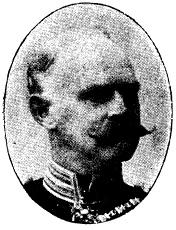Viktor Balck

Viktor Gustaf Balck, KCMG (April 25, 1844 – May 31, 1928) was a Swedish officer and sports personality who was one of the original members of the International Olympic Committee and who is often called "the father of Swedish sports".
Military career
Balck was born in Karlskrona, Sweden and was a sailor in his youth. In 1861, he became a cadet of the Swedish Navy at the Swedish War Academy at Karlberg in Stockholm. After a while, he switched track to become a cadet in the Swedish army, and was active in fencing and gymnastics. He stayed on as assistant gymnastics instructor at Karlberg for a while, and was promoted to second lieutenant in the Närke regiment in 1866. He was promoted to lieutenant in 1875 at the same regiment and to captain in 1884.[1]
However, his military career came to be devoted almost entirely to gymnastics and sports. He was assistant teacher at Karlberg 1868-1870 and gymnastics teacher at the Swedish cavalry riding school at Strömsholm 1870-1872. He became teacher of military gymnastics and fencing at the Swedish Central Institute of Gymnastics in 1885, was head teacher of the same subject 1887-1909 and the Institute's director 1907-1909.[2] He was promoted to major in the Swedish Army in 1894, to lieutenant colonel in 1900 and to colonel in 1904.[1] In 1909 he transferred to reserve status and in 1914 he received an honorary promotion to major general.[2]
Career as sports leader
Directly after completing his officer's training, Black studied the pedagogical, military and medical course at the Swedish Central Institute of Gymnastics 1866-1868, and stayed on as assistant teacher at the Institute 1868-1870, while also being an assistant teacher at Karlberg. From 1872, his main activities - both in military and civilian gymnastics and sports - had the Institute as a base.
As a young officer and gymnastics teacher, Balck was of the impression that voluntary gymnastics and sports activities in Sweden, i.e., outside the army and the schools, were undeveloped in comparison to the contemporary situation in many other countries. Determined to change this, from the 1870s he participated in the formation of several sporting clubs and organisations, and the founding of several related journals.[1] During this time, Swedish organised sports took shape, and Balck became one of its leading figures.
International sports career
Balck also became involved in the emerging international sports movement at the end of the 19th century. In 1894 he became one of the original members of International Olympic Committee (IOC), and was one of two vice presidents of the Swedish Olympic Committee from 1913 to his death in 1928. He was also one of the leading figures behind the Nordic Games which were arranged from 1901.[3]
Already in 1894 in IOC, Balck had proposed Stockholm as a venue for the Olympic Games. The official application to arrange the games came in 1908, and despite strong competition from Berlin, Stockholm were chosen to host the 1912 Summer Olympics with Balck a prominent member of the national organising committee.[3]
He was also a president of the International Skating Union from 1894 and 1924. His ice skating career also included the construction of the "Balck skate".
In recognition of his international sports career, Balck was made an honorary KCMG, and was thereafter able to style himself as Viktor Balck, KCMG. [2]
